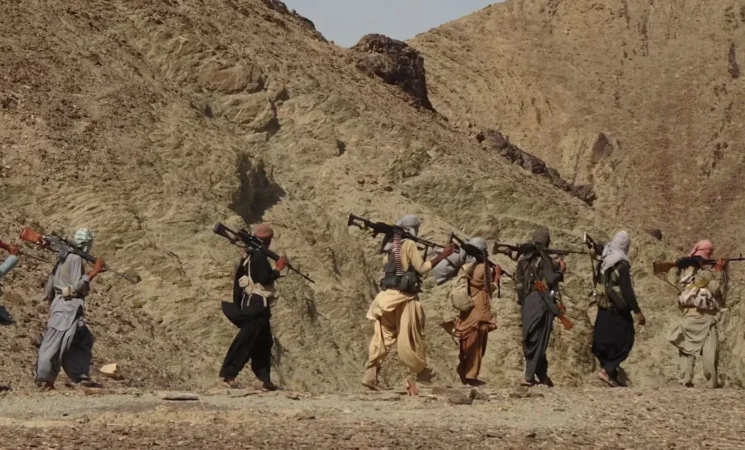10 April 2025, NIICE Commentary 10201
Akshita Malik & Dr. Karamala Areesh Kumar
Balochistan, Pakistan’s resource-rich yet politically marginalised province, has long been a hotspot of ethno-nationalist unrest. Tribal dynamics involving the Bugti, Marri, Mengal, and Rind tribes, alongside grievances of exclusion, have created fertile ground for sustained insurgency. Among the spectrum of armed groups active in the region, the Majeed Brigade has emerged as the most tactically radical and symbolically potent wing of the BLA. It has transitioned from guerrilla skirmishes to a sophisticated form of suicide militancy aimed predominantly at state and foreign economic actors. This shift threatens Pakistan's internal cohesion and has broader implications for regional security and global counterterrorism strategies.
Emergence of the Majeed Brigade
The Brigade’s origin is steeped in symbolism. It was formed in 2010, inspired by the self-sacrificial act of Majeed Langove Junior, who delayed security forces to allow fellow insurgents to escape. Aslam Baloch, a senior BLA commander, institutionalised this ethos by establishing the Majeed Brigade as a suicide squad. Their first major attack in December 2011 targeted Shafiq Mengal, a pro-government militia leader. Though the attempt failed to eliminate the target, it killed 14 civilians and demonstrated the Brigade’s operational intent. For several years, the Brigade lay dormant due to resource constraints. However, a strategic revival in 2018 coincided with escalating tensions surrounding CPEC projects, and the Brigade resumed operations with renewed intensity and technical sophistication.
Strategic Objectives and Symbolic Warfare
The Brigade’s goals are threefold: to establish an independent Balochistan, to disrupt Pakistan’s economic integration—particularly with China—and to internationalise the Baloch cause. The targeting of Chinese nationals and institutions such as the Confucius Institute reflects a deliberate shift toward attacking symbols of international cooperation with Pakistan. These attacks also aim to damage Pakistan’s economic aspirations by undermining the credibility of CPEC, a flagship Belt and Road Initiative (BRI) project.
The use of suicide bombers, including female operatives such as Shari Baloch and Sumaiya Qalandrani, highlights a broader effort to disrupt state narratives, gain global media attention, and challenge gendered assumptions of militancy. These attacks serve a dual purpose: psychological warfare against the state and narrative warfare on the international stage.
Regional Security Implications
The Majeed Brigade’s operations have destabilised not just Pakistan but also strained its diplomatic ties with China. High-profile attacks—in Dalbandin (2018), at the Chinese Consulate in Karachi (2018), the Pakistan Stock Exchange (2020), and the Confucius Institute (2022)—demonstrate a clear pattern: the selection of targets that maximise economic, political, and psychological fallout.
The Brigade complicates regional counterterrorism strategies by extending its operational capacity beyond traditional militant targets to economic infrastructure and foreign personnel. The fallout includes disruptions to bilateral relations, increased securitisation of development projects, and mounting internal pressure on Islamabad to manage insurgency without alienating local populations.
Tactical Shifts and Funding
Post-2011, the BLA’s decision to incorporate suicide terrorism marked a significant departure from previous tactics. The Majeed Brigade now employs both vehicle-borne (VBIED) and person-borne (PBIED) methods aimed at inflicting maximum casualties and media visibility. Structurally, it is divided into cells specialising in logistics, operations, and intelligence. The recruitment strategy leverages social marginalisation and political disenfranchisement, particularly among Baloch youth and women. The Brigade has become a formidable force with 150 members, including operatives trained or educated abroad. However, its increasing reliance on suicide missions has alienated some local sympathisers and led to ethical debates even within the broader nationalist movement.
The Majeed Brigade finances its operations through criminal activities like extortion, smuggling, and control over coal mining zones. Pakistan has consistently accused India of supporting Baloch insurgents, although definitive international proof remains contested. The post-U.S. withdrawal environment in Afghanistan has further facilitated the illegal arms trade, enabling militant groups like the BLA to acquire advanced weaponry with relative ease.
Conclusion: A Critical Juncture
The Majeed Brigade exemplifies a growing trend in which subnational insurgent groups embrace globalised tactics to wage localised conflicts. While its short-term operational success has bolstered the BLA's visibility, it has also intensified state crackdowns and eroded local support. The group now stands at a crossroads: continue on a path of high-casualty symbolism at the risk of broader alienation or recalibrate its strategy in response to evolving regional dynamics and counterterrorism measures. The future trajectory of the Majeed Brigade will hinge on Pakistan’s ability to balance military response with political inclusion and economic justice in Balochistan. Without addressing root grievances, state suppression alone may prove insufficient to dismantle an insurgency whose tactics are as much about spectacle as sovereignty.
Akshita Malik is a Research Scholar at the Department of International Relations, Peace, and Public Policy, St. Joseph’s University, Bengaluru, India & Dr. Karamala Areesh Kumar is the Head, Dept. of International Relations, Peace, and Public Policy (IRP and PP), St. Joseph’s University, Bengaluru, India.

